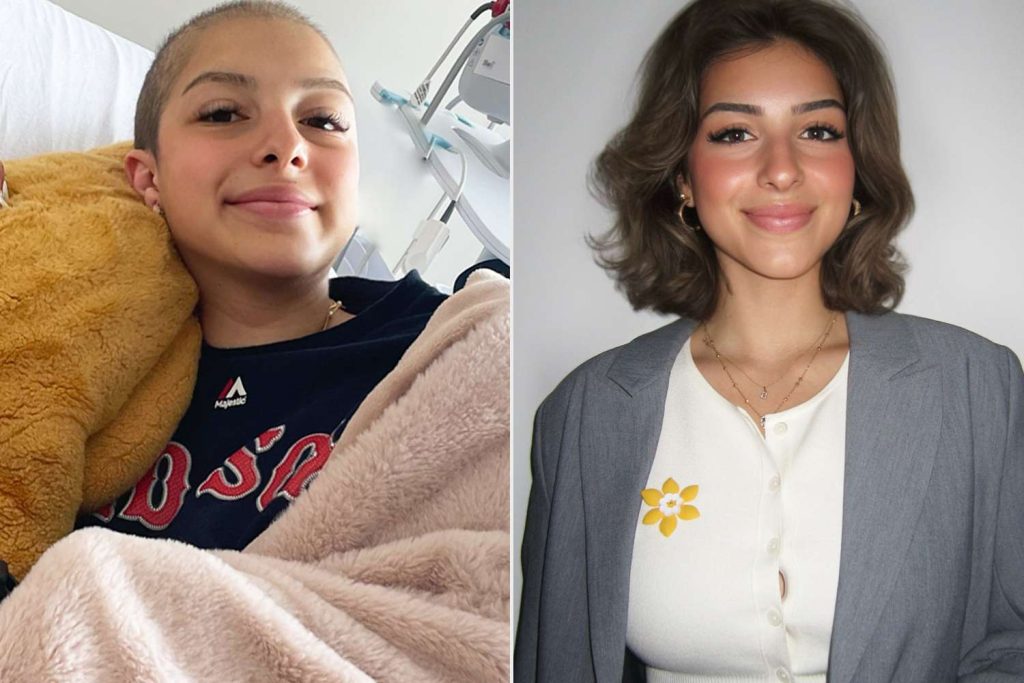:max_bytes(150000):strip_icc():format(jpeg)/Woman-survives-cancer-081825-1-714564bd65014830b903d16f36c0a15f.jpg)
NEED TO KNOW
- Hanna Bordage was diagnosed with cancer at 19
- Bordage was experiencing chronic neck pain before her diagnosis
- Now, she shares her story online to alert people to potentially unknown symptoms of cancer
Hanna Bordage never knew neck pain could be a sign of cancer.
After graduating from high school, she headed to university in New Brunswick, Canada, where she played varsity soccer. Despite the start of an exciting new chapter, the then-19-year-old was constantly tired and felt like she wasn’t playing to her full ability. However, she just chalked it up to all the recent changes in her life.
After a while, she started experiencing chronic neck pain, but couldn’t figure out its cause. As a pre-med student with hopes of becoming a doctor one day, Bordage was taking biology classes, hoping to figure out the root of her issues.
Courtesy of Hanna Bordage
“I remember thinking, ‘I wish I could figure out what’s wrong with me, what’s wrong with my neck,'” she tells PEOPLE. “The one symptom that was odd, that couldn’t be explained, was the one where I have neck pains when I drink.”
“I would have a drink of alcohol, and within five to 10 minutes, I would have aching pains in my shoulder, my neck,” she adds.
In addition to the neck pain, Bordage was experiencing night sweats, but assumed it was due to the temperature in her dorm being hotter than her childhood home.
It wasn’t until she got hit in the head during soccer practice that she was sent to a doctor. While they were checking to see if she had a concussion, they discovered something much more grave.
When her doctor did her full body scan, she noticed that Bordage had a heart murmur. Her doctor then ordered an echocardiogram (ECHO) and an electrocardiogram (EKG). To cover their bases, Bordage also asked for an MRI.
After all the testing, Bordage was asked to come back to the hospital the next day. It was then that doctors revealed they had found a 12-centimeter tumor near her heart. At first, her doctors suggested she may have blood cancer.
Courtesy of Hanna Bordage
“It took days and weeks, and then when I finally got biopsied, that’s when they saw it was a late stage of Hodgkin Lymphoma. They told me, ‘You’re going to need to do chemotherapy. You’re going to need to do 12 rounds, and if that does not work, you’re going to need radiation,'” she recalls.
According to the American Cancer Society, common symptoms of Hodgkin Lymphoma include swollen lymph nodes, which can cause pain when drinking, fever, night sweats and feelings of lethargy.
Bordage credits her family, friends, and soccer team for being her endless support system.
“Throughout my life, and especially into my teens, into being 20 at the time, I was shown friendship. I was shown empathy. I was shown how to react to circumstances that you didn’t want to happen,” Bordage shares.
Bordage shared her experience on social media, documenting how her life changed as she went through treatment and offering guidance to other teens who are going through the same thing.
Courtesy of Hanna Bordage
Bordage, now 22, says strangers going through cancer often reach out to her via direct message for advice and support.
“I didn’t wait too long for posting. I posted the video saying, ‘Hey guys, I have cancer’ at the end of January, and I got diagnosed at the end of December,” she says. “I wanted to speak to as many people as possible, because I had a new perspective and wanted to share it.”
“I could die or I could live. I wanted to show people that you can go through things that completely terrify you, that shake you to your core and change you forever, and you can continue to be the positive, optimistic version of yourself,” she adds.
After six months of chemotherapy, Bordage rang the bell on June 29, 2023. She recently celebrated her two-year “cancerversary.”
Courtesy of Hanna Bordage
With this newfound lease on life, Bordage stills plans to go into the medical field, in hopes of researching the type of cancer she had. She also wants to become a patient advocate, having advocated for herself during her treatments.
“I was diagnosed on Dec. 16, 2022, and I had my symptoms for a year before I was diagnosed,” she says. “It put into perspective for me how many people feel alone when they can’t find answers to their problems, and how I was so privileged in the way that I had access to all these doctors I was still not finding the answers.”
“I’m now a research assistant at my university and I do cancer research on the specific type of cancer I had, and that work is very important to me,” she adds.
Bordage is now continuing with her studies and hopes to go to medical school. She says she wants to offer the care and treatment to other patients that she had access to.

